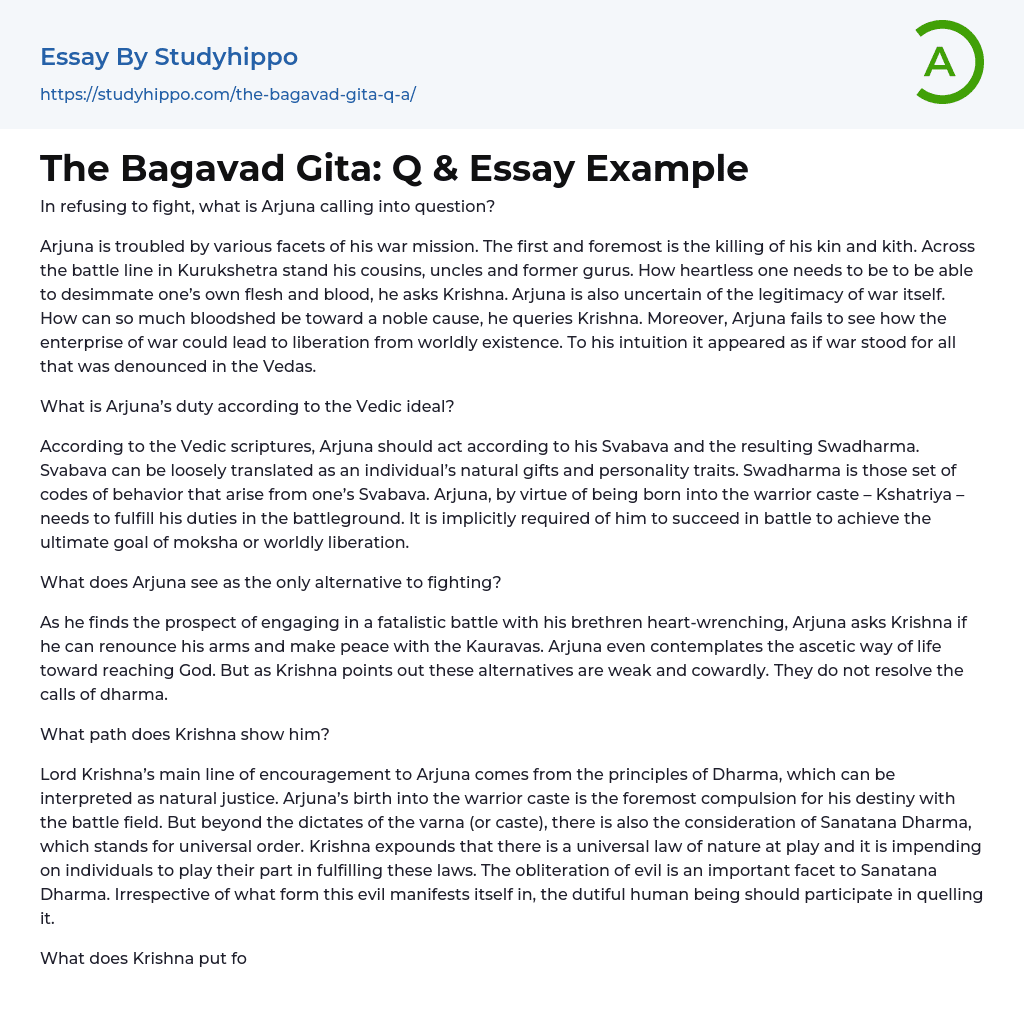Arjuna questions his decision to not participate in the battle and expresses concerns regarding various aspects of his war mission. His main worry revolves around the idea of having to kill his own relatives and mentors, who are positioned on the opposing side in Kurukshetra. Arjuna reflects upon how someone could be so lacking in empathy as to bring destruction upon their own family.
Arjuna questions the legitimacy of war and its noble cause. He is unsure of how so much bloodshed can be justified. Additionally, Arjuna does not understand how engaging in war can lead to liberation from worldly existence. In his intuition, war represents everything that goes against the teachings of the Vedas. The Vedic scriptures state that Arjuna's duty is to act in accordance with his Svabava and the resulting Swadharma.
"Svabava" refers to an individual's natural ta
...lents and personality traits, while "Swadharma" represents the behavioral codes that stem from one's Svabava. Arjuna, as a member of the warrior caste known as Kshatriya, is obligated to fulfill his duties on the battlefield. His success in battle is crucial for attaining moksha, or worldly liberation. However, Arjuna views renunciation of weapons and reconciliation with the Kauravas as the only viable alternative to fighting. This decision is driven by his profound anguish at the thought of engaging in a fatalistic battle against his own kin, prompting him to seek Krishna's advice.
Arjuna considers adopting a ascetic lifestyle as a means to reach God, but Krishna dismisses these options as ineffective and lacking in courage. These alternatives do not address the obligations of dharma. Krishna shows him a different path. He encourages Arjuna based on the principle
of Dharma, which can be understood as the concept of natural justice. Arjuna's birth into the warrior caste is the primary factor driving his destiny on the battlefield.
According to the varna system, following rules is crucial. However, Sanatana Dharma represents universal order. Krishna explains that everyone must obey a natural law and individuals are responsible for contributing towards fulfilling these laws. Eliminating evil is a vital aspect of Sanatana Dharma, and individuals should actively work towards suppressing it regardless of its form.
Krishna presents the merging of jeevatma and paramatma as the key to liberation from rebirth, known as moksha. However, this goal cannot be achieved solely through esoteric ascetic practices. It is equally crucial to fulfill one's obligations towards oneself and society. The guidelines for achieving moksha through worldly actions are outlined in Yogic texts as Karma Yoga.
Krishna explains to Arjuna that the battlefield of Kurushetra can serve as a platform for his own liberation. He upholds both the Vedic viewpoint of supporting the world and the world-denying perspective. Krishna shows Arjuna that the monistic and dualistic beliefs about the world can coexist. He teaches Arjuna that virtuous actions in the worldly realm can lead to cosmic integration. Krishna encourages Arjuna to unify his wisdom, devotion, and longing for liberation from earthly existence by invoking the concept of Saguna Brahman or Personal God. According to this belief, even mundane daily tasks can aid in liberation if performed with the right mindset. Hence, Arjuna need not renounce everything connected to the world.
Krishna encourages Arjuna to view Kurushetra as a representation of the ethical battle that supports spiritual development. This suggests that even the aggressive atmosphere
of the battlefield can be converted into spiritual consciousness. Adopting this perspective is vital for Arjuna to fulfill his dharma. (Source: The Bagavad Gita, translated by Shri Purohit Swami, retrieved from http://www.holybooks.com/wp-content/uploads/The-Bhagavad-Gita-Translation-by-Shri-Purohit-Swami.pdf on 16th May, 2013)
- Mahayana essays
- Age Of Enlightenment essays
- Ethos essays
- Time essays
- Acceptance essays
- Meaning Of Life essays
- Reality essays
- Natural Law essays
- Political Philosophy essays
- Utilitarianism essays
- Existence essays
- Free Will essays
- Good And Evil essays
- Confucianism essays
- Relativism essays
- Conscience essays
- Environmentalism essays
- Empiricism essays
- Epistemology essays
- Ethics essays
- Existentialism essays
- Human Nature essays
- Individualism essays
- Metaphysics essays
- Philosophy Of Life essays
- Transcendentalism essays
- Truth essays
- Destiny essays
- Determinism essays
- Fate essays
- Functionalism essays
- Philosophers essays
- Pragmatism essays
- Future essays
- Child Observation essays
- Critical Reflection essays
- Teaching Philosophy essays
- Personal Philosophy essays
- Action Speak Louder Than Words essays
- Can Money Buy Happiness essays
- Values of Life essays
- Ethical dilemma essays
- Normative Ethics essays
- Virtue Ethics essays
- Belief essays
- Deontology essays
- Moral essays
- Virtue essays
- Work Ethic essays
- Henry David Thoreau essays




